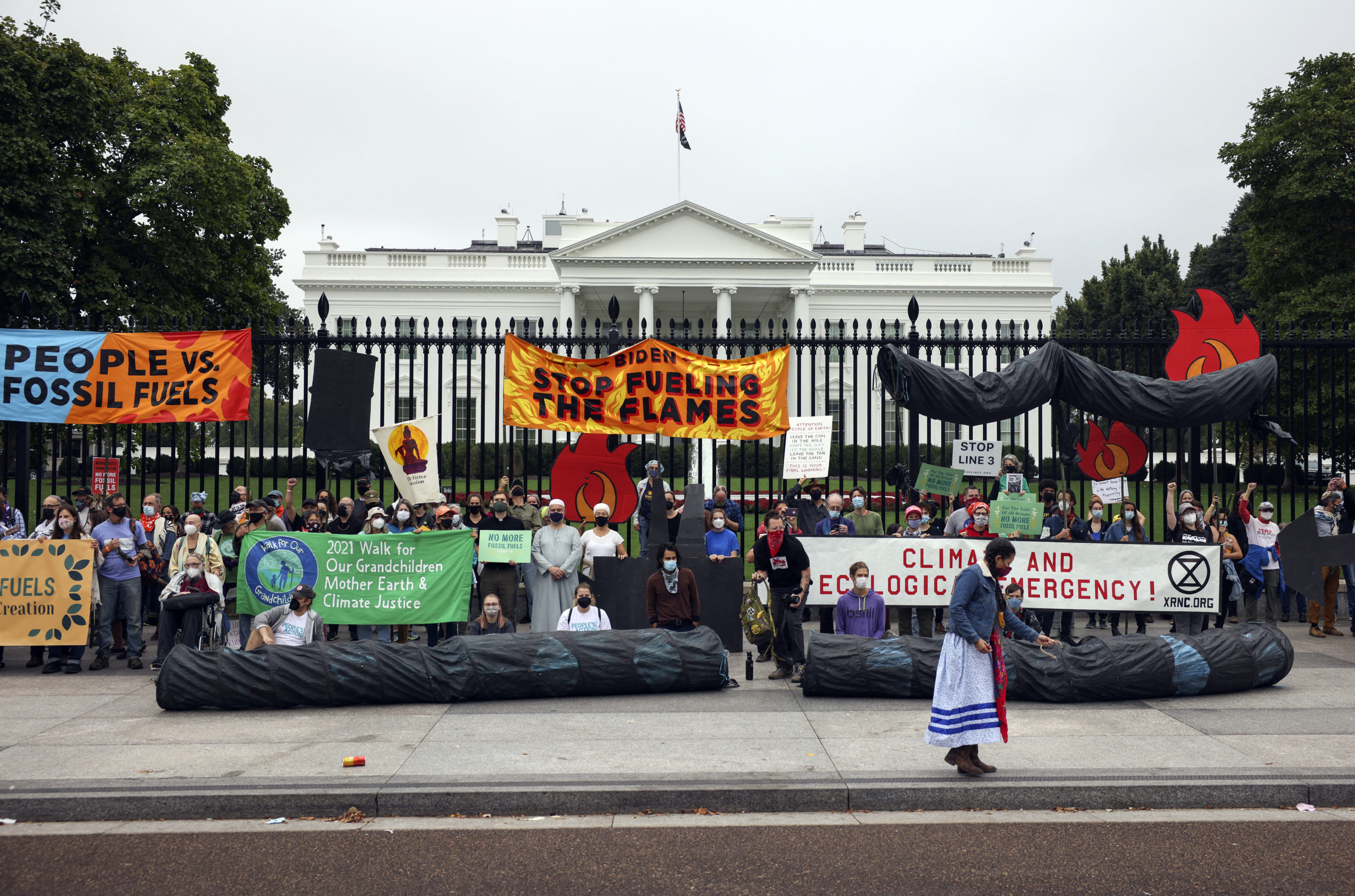WHO: Covid recovery plans should include climate action
WASHINGTON, DC – OCTOBER 12: Climate protesters demonstrate in front of the White House on October 12, 2021 in Washington, DC. The group was urging the Biden administration to do more to curb climate change and ban fossil fuels. Kevin Dietsch/Getty Images/AFP (Photo by Kevin Dietsch / GETTY IMAGES NORTH AMERICA / Getty Images via AFP)
MANILA, Philippines — The World Health Organization (WHO) is calling climate change the “single biggest threat facing humanity,” as it urged governments to take swift action to respond to the unfolding global crisis.
In a report released weeks ahead of the United Nations climate change conference in Glasgow, Scotland, the WHO governments should not only commit to a healthy and green recovery from the coronavirus pandemic but also to place health and social justice at the heart of the climate talks.
ADVERTISEMENT
“The next few years present a crucial window for governments to integrate health and climate policies in their COVID-19 recovery packages,” read the report, which outlined recommendations developed in consultation with over 400 experts and health professionals and 150 organizations.
“While near-term pandemic responses will largely set the pace and direction of health and climate goals, ambitious national climate commitments will be crucial to sustain a healthy recovery in the mid- to long-term,” it added.
France, Japan joining PH-US maritime exercises
In defense of Bongbong Marcos and his Oxford fantasy
Intimate, delicate links
Dr. Tedros Ghebreyesus, the WHO director general, said the pandemic had shone a light on the “intimate and delicate links” between humans and the environment, and that the same unsustainable choices killing the planet were also killing people.
“WHO calls on all countries to commit to decisive action at COP26 to limit global warming to 1.5 degrees Celsius-not just because it’s the right thing to do, but because it’s in our own interests,” he said.
COP26 refers to the 26th Conference of the Parties to the UN Framework Convention on Climate Change, where world officials will gather in November to discuss the way forward in stemming the worst impacts of the climate crisis.
The 82-page report stressed that climate change is already affecting health in many ways, like in the deaths and illnesses attributable to increasingly frequent extreme weather such as storms and heatwaves, as well as the rise in zoonotic and vector-borne diseases, disruption in food systems, and mental health issues.
“Strengthening resilience and building adaptive capacity to climate change… can also lead to health benefits,” it said. “The public health benefits resulting from ambitious mitigation efforts would far outweigh their cost.”
Transition to renewables
Among the report’s recommendations is a just transition to renewable energy sources and moving away from the use of fossil fuels, such as coal.
“The burning of fossil fuels is killing us, causing millions of premature deaths every year through air pollutants, costing the global economy billions of dollars annually, and fueling the climate crisis,” the report read. “Governments and the private sector can support a green and healthy recovery from COVID-19 by reforming energy subsidies so no public money goes to fossil fuel production.”
ADVERTISEMENT
WHO also called on governments to reimagine urban environments, transport and mobility by promoting sustainable and healthy urban designs, increasing access to green and blue public spaces, and prioritizing walking, cycling and public transport.
45M signatures
Alongside the release of the report was an open letter calling for national leaders and COP26 country delegations to step up climate action, signed by at least 45 million doctors, nurses and health professionals worldwide, representing over two-thirds of the global health workforce.
In the letter, the health workers said the “rapidly growing” climate crisis could be “far more catastrophic and enduring” than the COVID-19 pandemic.
“Integrating health and equity into climate policy will protect peoples’ health, maximize returns on investments and build public support for the urgently needed climate actions,” the letter read. “These climate actions must be taken now to protect the planet, and the health, well-being and prosperity of all people alive today and for generations to come.”
Subscribe to our global nation newsletter
Read Next
France, Japan joining PH-US maritime exercises
EDITORS’ PICK
MOST READ
Don’t miss out on the latest news and information.
View comments



